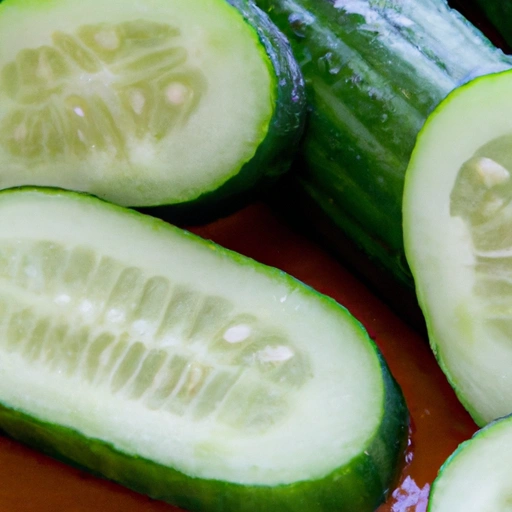Cucumber
Description

Cucumber, a widely cultivated plant in the gourd family Cucurbitaceae, is a refreshing and versatile food ingredient known for its crisp texture and mild, slightly sweet flavor. It is commonly used raw in salads, sandwiches, and as a garnish, but can also be cooked and pickled. Cucumbers are comprised mostly of water, making them hydrating and low in calories, which is ideal for health-conscious diets. Whether you measure in ounces, grams, cups, or milliliters, cucumbers are a staple in kitchens around the world.
Common uses
Cucumbers are primarily consumed fresh and are a staple in salads such as the Greek tzatziki, the Indian raita, or the simple garden salad. They are also popularly pickled and preserved, which can be found in various cuisines around the world, including American dill pickles and Scandinavian pickled cucumbers. Additionally, cucumbers can be used in beverages like infused waters and cocktails, such as the Pimm's Cup, for a refreshing taste.
Nutritional value
Calories
A standard cucumber (with the peel, measuring approximately 8.25 inches or 300 grams) contains roughly 45 calories (188 kJ).
Protein
Cucumbers are not a significant source of protein, with about 2 grams per cucumber.
Fat
Cucumbers contain a negligible amount of fat, less than 0.5 grams per cucumber.
Carbohydrates
Most of the calories in cucumbers come from carbohydrates, with about 11 grams per cucumber, which includes natural sugars and dietary fiber.
Vitamins
Cucumbers provide a modest amount of vitamins, particularly vitamin K, with a single cucumber offering about 19% of the recommended daily value.
Minerals
They also offer some minerals like potassium, with an average cucumber providing about 442 milligrams, and smaller amounts of magnesium and calcium.
Health benefits
Cucumbers are known for their high water content, which promotes hydration. The presence of dietary fiber aids in digestion and weight management. Moreover, cucumbers contain antioxidants like flavonoids and tannins, which can help in reducing inflammation and protecting against chronic diseases. The vitamin K content is important for bone health and proper blood clotting.
Potential risks
While cucumbers are generally safe and healthy to eat, they can cause allergic reactions in some individuals. Overconsumption of cucumbers with high levels of pesticides can pose health risks; therefore, it's advisable to wash them thoroughly or purchase organic varieties. Additionally, pickled cucumbers can be high in sodium, which should be considered by individuals monitoring their salt intake.
Common recipes
Cucumbers are featured in a range of recipes such as salads, sandwiches, sushi, gazpacho, and various dips. They are also commonly used in pickles and relishes.
Cooking methods
Though typically consumed raw, cucumbers can be sautéed, steamed, or stir-fried. They should be cooked briefly to maintain their crunchy texture.
Pairing with other ingredients
Cucumbers pair well with dill, mint, yogurt, tomatoes, garlic, citrus juices, and vinegars. They also complement both mild cheeses and robust meats like salmon or pork.
Summary
Cucumbers are a refreshing and hydrating ingredient suitable for a variety of dishes. With their low-calorie count and beneficial nutrients, they offer both health advantages and culinary versatility. From crisp salads to tangy pickles, cucumbers can enhance the taste and nutritional value of meals for people around the globe.